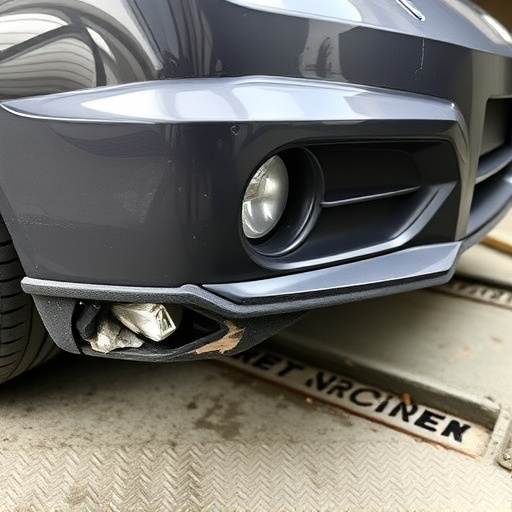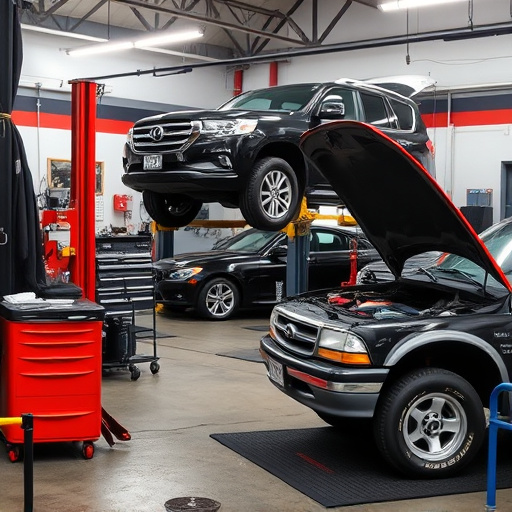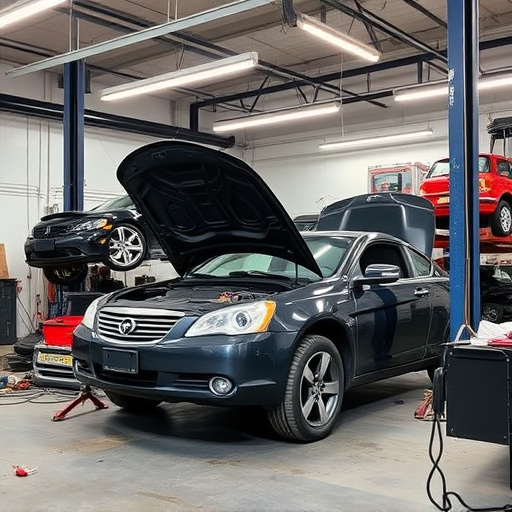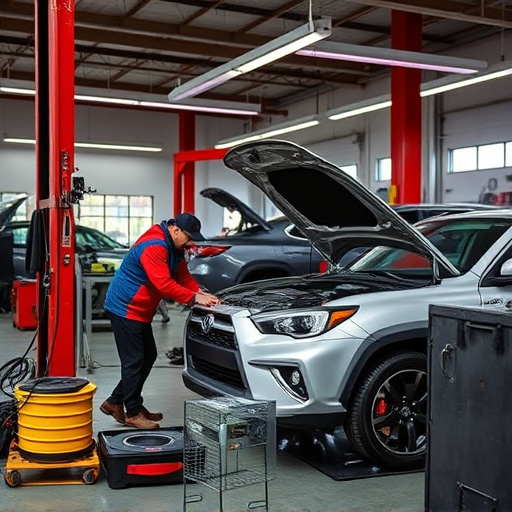Ultrasonic thickness gauges are advanced tools for non-destructive measurements in automotive applications, especially crucial for identifying hidden dents and delaminations. Essential for repair professionals, these gauges enable quality control and structural integrity assessments, ensuring vehicle safety and reliability by detecting subtle changes in metal thickness. Critical in frame rail inspection, they play a pivotal role in precision measurements throughout car production, paint repairs, and dent removals, preserving structural soundness. Versatile and efficient, ultrasonic thickness gauges are indispensable for maintaining top automotive standards in both manufacturing and post-accident maintenance.
“Unveiling the significance of ultrasonic thickness gauges in automotive frame rail evaluations, this article offers a comprehensive insight into a technology that revolutionizes quality control. Ultrasonic thickness gauges, with their advanced capabilities, play a pivotal role in ensuring structural integrity and precision during vehicle manufacturing.
From understanding the technology behind these instruments to exploring their critical application in frame rail inspection, we delve into the benefits they bring to the automotive industry.”
- Understanding Ultrasonic Thickness Gauge Technology
- Frame Rail Inspection: A Critical Process
- Benefits and Applications in Automotive Industry
Understanding Ultrasonic Thickness Gauge Technology

Ultrasonic thickness gauges leverage advanced technology to measure the depth or thickness of materials non-destructively. They work by sending high-frequency sound waves into the surface and then analyzing the echo that reflects back, which varies based on material density and thickness. This innovative approach ensures accurate measurements without causing damage, making it invaluable in various industries, including automotive. In auto body repairs and paintless dent repair processes, these gauges play a pivotal role by enabling precise assessment of panel integrity, helping to identify hidden dents or delaminations that might go unnoticed through visual inspection alone.
For car body repair professionals, ultrasonic thickness gauges provide critical data for informed decision-making. They aid in quality control by ensuring repairs maintain structural integrity and original material properties. Moreover, their ability to detect subtle variations in metal thickness can prevent costly mistakes and ensure the safety and reliability of vehicles undergoing restoration or renovation.
Frame Rail Inspection: A Critical Process

Frame rail inspection is a critical process in automotive manufacturing and maintenance that demands precision and accuracy. These inspections are crucial for ensuring structural integrity, identifying potential weaknesses, and preventing catastrophic failures. Ultrasonic thickness gauges play a pivotal role in this evaluation by providing non-destructive testing capabilities. By sending high-frequency sound waves through the metal, these gauges measure the thickness of the frame rail with remarkable accuracy, revealing any discrepancies or defects that may be detrimental to the overall vehicle safety.
This meticulous process is essential for various stages, from initial car production to subsequent paint repairs and dent removals. In cases of car dent repair, for instance, understanding the original frame rail thickness aids technicians in making precise adjustments while ensuring the structural soundness of the vehicle. The ultrasonic thickness gauge becomes a reliable tool, offering fast and detailed measurements, which are indispensable for professionals navigating the intricate landscape of automotive restoration and maintenance, including car paint repair processes.
Benefits and Applications in Automotive Industry

In the automotive industry, precision is key, especially when it comes to ensuring structural integrity and quality control. This is where ultrasonic thickness gauges play a vital role in frame rail evaluations. These advanced non-destructive testing tools offer numerous benefits for car bodywork assessments. By emitting high-frequency sound waves, ultrasonic thickness gauges measure the thickness of materials with remarkable accuracy, enabling detailed inspection of critical components like frame rails.
This technology is invaluable in collision centers and bumper repair shops, where precise measurements are essential to accurately assess damage and ensure proper repairs. Ultrasonic thickness gauges help detect even the slightest variations in metal thickness, identifying potential weaknesses or irregularities that could compromise vehicle safety. Their versatility allows for efficient quality control during manufacturing and effective maintenance after accidents, making them indispensable assets for maintaining top-notch automotive standards.
Ultrasonic thickness gauges play a pivotal role in frame rail evaluations, ensuring the integrity and quality of automotive structures. By non-destructively measuring metal thickness, these advanced tools help identify potential issues, enhance safety, and streamline production processes within the automotive industry. Incorporating ultrasonic thickness gauge technology is a game-changer for maintaining high standards in vehicle manufacturing.














